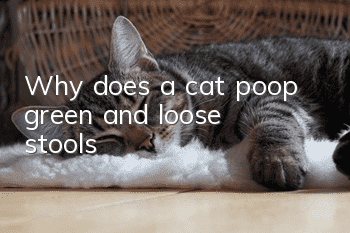Cat digestive system diseases - chronic vomiting, intestinal diseases

Cat digestive system diseases - chronic vomiting, intestinal diseases 01Chronic vomiting:
Chronic vomiting is more common than acute vomiting. At first, the cat vomits very rarely (less than once every two months), and then the frequency increases to once a week, three days, or even once a day.
Generally, cats will still have appetite and be in good spirits after vomiting, which is why cat owners tend to ignore this type of vomiting. And because cats often vomit hair, this type of vomiting is often considered to be hairball disease.
Cats with chronic vomiting need to be confirmed through examination, because most of them have inflammatory bowel disease or intestinal lymphoma. These diseases can cause the wall of the small intestine to thicken and can be diagnosed with ultrasound;
In addition, food intolerance is also a cause of chronic vomiting. Using novel protein diets (such as rabbit, duck or venison) or hydrolyzed protein diets as food experiments can also be used for diagnosis and treatment.
02Inflammatory bowel disease:
Spontaneous inflammatory bowel disease refers to gastrointestinal diseases caused by normal inflammatory cells infiltrating the gastrointestinal mucosa.
Inflammatory bowel disease usually occurs in middle-aged to older cats, with an average age of about 8 years (5 months to 20 years old).
Inflammatory bowel diseases are classified according to the infiltrating inflammatory cells. The most common is lymphocytic-plasmacytic gastroenteritis.
The cause of inflammatory bowel disease is not yet clear, but there are many hypotheses. Possible causes include immune diseases, gastrointestinal permeability defects, food allergies or intolerance, genetics, Psychological factors and infectious diseases.
(1) Common symptoms:
Chronic intermittent vomiting is most common when cats develop inflammatory gastrointestinal diseases.
Other possible symptoms include diarrhea, weight loss, and anorexia, but there are usually no abnormalities on clinical examination.
The diagnosis of inflammatory bowel disease must first exclude other potentially similar diseases, and then suspect the possibility of inflammatory bowel disease after ruling them out one by one.
(2) Common diagnostic methods:
① Basic tests: including complete blood count, basic serum biochemistry and urinalysis.
②Stool examination;
③Piroplasma ELISA kit;
④Bacterial culture and antibiotic sensitivity test;
⑤T4 test: It is recommended for all old cats with chronic gastrointestinal diseases to rule out hyperthyroidism.
⑥Abdominal ultrasound scan: abnormal masses, pancreatic diseases, etc. can be found.
⑦ Pathological tissue examination: Carry out sampling of the gastrointestinal tract and follow-up histopathological biopsy. Once the infiltration of inflammatory cells and the mucosal layer is confirmed, inflammatory bowel disease can be diagnosed based on this.
(3) Common treatment methods:
Most inflammatory bowel diseases will see symptom relief within a week with appropriate treatment.
Cats with severe intestinal disease (such as dehydration and weakness) may require intravenous treatment. Generally speaking, immunosuppressive treatment with hypoallergenic or hydrolyzed protein foods is still the main treatment for inflammatory bowel disease.
① Drugs: Except for lymphocytic-plasma cell colitis, steroids are the first choice drug for all inflammatory bowel diseases: they generally need to be taken for a long time for about a few months to half a year to determine the therapeutic effect and the doctor The diagnosis is the basis for treatment time.
During the treatment period, the dosage needs to be gradually reduced. Cat owners must not stop taking the medicine on their own, and the entire treatment process must be accompanied by hypoallergenic prescription feed.
② Food: The provision of prescription feed is an important part of the treatment of inflammatory bowel diseases. In some cats, lymphocytic-plasma cell colitis can control and alleviate symptoms without the need for drug treatment; In addition to hypoallergenic prescription feeds, grain-free single meat feeds are also an option.
(4) Prognosis:
Lymphocytic-plasmacytic inflammatory bowel disease (occurring in the stomach and small intestine) can usually be well controlled with prescription feeds and medications, but only a few can be completely cured, so most prescription feeds Give throughout your life.
If inflammatory bowel disease is complicated by liver and pancreatic disease, the prognosis is poor.
Lymphocytic-plasma cell colitis (occurring in the large intestine) can usually be controlled by just giving prescription feed, and is considered an inflammatory bowel disease with a good prognosis.
Other inflammatory bowel diseases do not necessarily respond to treatment. For example, eosinophilic inflammatory bowel diseases usually have tumor-like characteristics and can infiltrate into other organs or tissues (such as bone marrow). Its prognosis is poor.
- How to treat jaundice in cats
- Cat's hair is mixed with white dander
- What should I do if my cat gets angry?
- Can cats eat kiwi fruit?
- What are the causes of autism in cats?
- How to raise British shorthair cats?
- What foods can’t cats eat? 10 foods that cats can’t eat
- Can cats eat mangosteen?
- What toys do cats like?
- It’s important to know how to raise cats at home. When selecting breeds, focus on personality.



